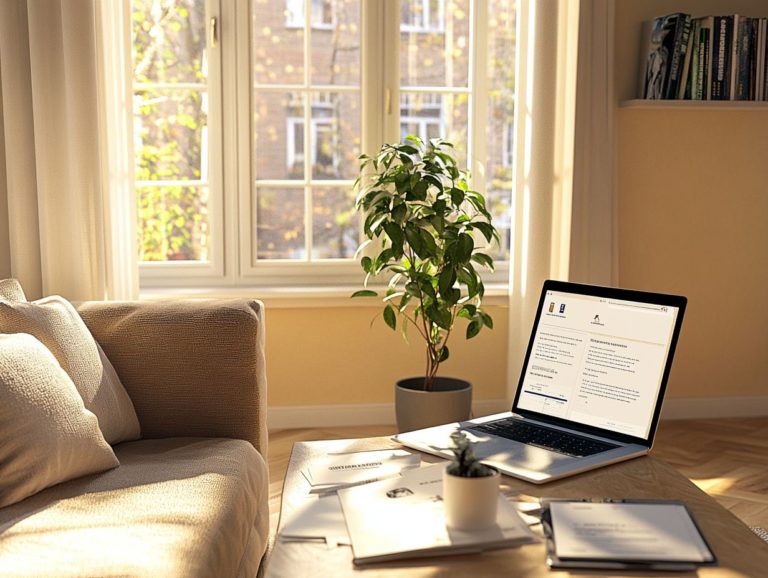5 Key Benefits of Home Insurance You Should Know
Home insurance is more than just a policy; it s your shield, safeguarding your most valuable asset your home.
By understanding its benefits, you can make informed decisions about protecting your property and belongings. This article delves into five key advantages of home insurance, ranging from protection against natural disasters to coverage for your personal property and liability.
You ll also find insights on various types of insurance, factors that influence costs, strategies for saving, common exclusions, and essential considerations when selecting a policy.
Jump in to see how home insurance can transform your sense of security!
Contents
- Key Takeaways:
- 1. Protects Your Home from Natural Disasters
- 2. Covers Damage and Loss of Personal Property
- 3. Provides Liability Coverage
- 4. Offers Additional Living Expenses Coverage
- 5. Gives You Peace of Mind
- What Is Home Insurance and How Does It Work?
- Frequently Asked Questions
- What is home insurance and why is it important?
- What are the 5 key benefits of home insurance?
- How does home insurance protect my property and belongings?
- Do I really need home insurance if I own my home?
- What is liability protection and why is it important in home insurance?
- Are there any benefits to having home insurance?
Key Takeaways:

Visualize the benefits right here!
- Protect your home from natural disasters.
- Ensure coverage for damage and loss of personal property.
- Have peace of mind knowing you re protected from liability.
1. Protects Your Home from Natural Disasters
Home insurance is essential for protecting your property from the unpredictable nature of natural disasters. To make informed decisions, consider these 5 things to know about local home insurance providers. It ensures complete protection against events like hurricanes, floods, and wildfires, which can lead to significant property damage and financial strain.
By securing a reliable home insurance policy tailored to your unique needs, you can rest easy. Exploring unique offerings from home insurance providers ensures that your home and personal assets are safeguarded against potential threats from extreme weather.
With various coverage options available, these policies can protect against specific perils. It s important to ensure that coverage limits align with your property’s value.
Many homeowners may be unaware that standard policies often don t include flood damage. Therefore, assessing the risks unique to your location is crucial. The premiums you pay are influenced by factors such as the likelihood of natural disasters in your area and the deductible the amount you pay out of pocket before insurance kicks in.
Insurance companies carefully evaluate claims based on documented evidence of damage. This ensures you receive the compensation you deserve to rebuild and recover from these unpredictable events.
2. Covers Damage and Loss of Personal Property
Home insurance is vital for protecting your personal property from damage or loss. It ensures you receive financial compensation for the replacement cost of your belongings in the event of theft, fire, or other unforeseen incidents. This safety net helps you recover faster from setbacks, as your insurance policy can include 5 must-have features in home insurance policies specifically designed to safeguard your valuable assets.
Among these coverages:
- Personal property protection shields items like furniture, electronics, and clothing;
- Liability protection covers lawsuits for injuries on your property;
- Additional living expenses cover lodging costs while repairs are underway.
When it s time to file a claim, understanding the process is essential. You should document every item that is lost or damaged and gather supporting evidence, such as receipts or photographs. Maintaining a thorough home inventory is invaluable. It helps you accurately assess the value of your possessions and streamlines the claims process especially when unexpected expenses arise during property damage situations.
3. Provides Liability Coverage
Liability coverage is an essential aspect of home insurance, designed to protect you from potential lawsuits that could arise from accidents on your property. This feature ensures you re equipped to handle legal fees and medical bills resulting from injury claims. It not only protects your personal assets but also gives you peace of mind, knowing that unexpected incidents won t compromise your financial security.
When an accident leads to personal injury on your property, liability coverage becomes crucial in addressing the medical expenses incurred by the injured party. It covers these costs while also considering any emotional distress or lost wages that may stem from the incident.
A claims adjuster typically steps in to evaluate the situation, thoroughly examining the circumstances surrounding the claim to ascertain the extent of liability. To maximize your protection, it’s wise to carefully review your policy features, considering any unique risk factors in your life such as the presence of pets or swimming pools and opting for higher limits or additional endorsements as needed.
4. Offers Additional Living Expenses Coverage

If your home becomes uninhabitable due to covered damages, homeowners insurance helps pay for living costs. This coverage provides essential financial support for temporary housing and necessary living expenses while your property undergoes repairs. It acts as a safety net, ensuring you don t face financial strain during challenging times.
This coverage helps pay for temporary housing, such as hotel stays or rental homes. It also covers extra food costs if you can t cook. However, be aware that insurance companies often impose limits on these expenses.
These limits can vary significantly based on your policy’s specifics. Some policies may offer a fixed dollar amount, while others might cap coverage at a certain duration, like up to 12 months.
To navigate this effectively, carefully review your individual policy. Understanding what qualifies as additional living expenses is crucial, as variations in coverage can greatly impact your financial protection.
5. Gives You Peace of Mind
Investing in home insurance offers you invaluable peace of mind. It ensures you have comprehensive coverage and financial protection to safeguard your significant investment against unforeseen events like natural disasters, theft, or liability claims. To learn more, check out these 5 things you didn’t know about home insurance.
This reassurance is essential for your comfort and for maintaining good relationships with mortgage companies, which often require adequate insurance coverage as part of their lending conditions.
A strong insurance policy alleviates anxiety about potential losses. You can feel secure knowing that if the unexpected happens, you won t have to shoulder the financial burden alone.
This vital security fosters a tranquil living environment and boosts your confidence in making future home improvements or investments. It lays a stable foundation where you can thrive, allowing you to focus on creating cherished memories in your home.
What Is Home Insurance and How Does It Work?
Home insurance is an essential policy designed to offer you financial protection against various risks tied to property ownership. This includes coverage for property damage, theft, and claims for injuries or damage caused to others.
By understanding how home insurance operates, you can make informed decisions that safeguard your investments and ensure adequate coverage in unforeseen situations, especially by considering 5 key points about home insurance for new owners.
This type of insurance typically includes core components like dwelling coverage, personal property protection, and liability coverage, each addressing different facets of homeownership.
Key policy features such as deductibles, coverage limits, and additional endorsements can significantly influence the protection you receive.
As you explore available options, assess your unique needs, factoring in the value of your property and possessions, along with potential risks specific to your area.
Understanding the claims process is crucial, as it varies among insurers and directly impacts how swiftly and effectively you receive compensation when you need it most.
In conclusion, home insurance is vital for protecting your investment and ensuring your peace of mind. Before making a decision, consider these 5 things to know before buying home insurance to review your policy carefully and maximize your coverage and security.
What Are the Different Types of Home Insurance?
You will find a variety of home insurance policies out there, each designed with different coverage options to meet your unique needs as a homeowner.
Whether you are after comprehensive coverage that safeguards against numerous risks or basic coverage that focuses on essential protections, knowing the details of these policies is essential for choosing the right insurance solution to protect your property and personal assets effectively.
As you navigate this complex landscape, consider specialized policies that cater to particular situations, such as natural disasters or high-value belongings.
A comprehensive policy often covers a wide range of risks, including:
- Theft
- Fire
- Liability
This is ideal for those seeking maximum peace of mind. Conversely, if you are looking to minimize expenses and are comfortable with taking on more risk, basic coverage might be sufficient for you.
By carefully assessing your individual circumstances and financial capabilities, you can select a policy that not only mitigates your vulnerabilities but also aligns seamlessly with your overall budgetary goals.
What Factors Affect the Cost of Home Insurance?

The cost of home insurance hinges on a variety of factors, not the least of which are the risk assessment metrics that insurance companies employ to set your premiums. These premiums are the amounts you pay for your insurance coverage and can vary greatly depending on your location, the value of your property, and your specific coverage needs.
Understanding these elements is crucial for you as a homeowner if you want to manage your insurance rates effectively while still safeguarding your home and personal assets.
For example, if your property is situated in a high-crime area or a region that frequently faces natural disasters, you can expect to pay higher premiums due to the elevated risk. The age and condition of your home also significantly impact costs; older homes often require extra coverage for necessary structural repairs or renovations.
You can take advantage of adjusting your coverage amounts according to your current needs, potentially leading to savings. By conducting a thorough risk assessment, you will be able to pinpoint vulnerabilities and take proactive steps like enhancing security features or keeping up with property maintenance.
This not only positions you favorably when comparing insurance options, but it may also lead to more competitive premium rates.
How Can You Save Money on Home Insurance?
You can save big on home insurance with smart strategies. Take advantage of the discounts offered by providers, consider bundling your policies, and regularly review your coverage options for possible adjustments.
These steps help lower your premiums and secure competitive rates while maintaining adequate financial protection.
It is crucial for you to shop around for quotes from different insurance companies, as pricing can vary widely. By doing so, you can find a policy that fits your needs and budget.
Maintaining a good credit score is equally important; many insurers factor this into their rate calculations. By managing your credit responsibly, you can unlock even more savings.
Don’t forget to ask about specific discounts, such as those for installing security systems or smoke detectors, or for having a history free of claims. These small inquiries can greatly enhance your overall financial well-being.
Take a moment today to review your home insurance and see how much you can save!
What Are the Common Exclusions in Home Insurance Policies?
It s essential for you, as a homeowner, to understand the common exclusions found in home insurance policies. These exclusions can lead to unexpected costs if property damage or loss occurs that isn t covered by your policy.
Understanding these details helps you prepare. You ll know the risks that still exist, even with insurance. For example, many policies often exclude coverage for wear and tear. This means you might find yourself footing the bill for aging roofs or malfunctioning appliances.
Certain natural disasters, like floods and earthquakes, frequently fall outside standard coverage. You may need to seek additional coverage options if you live in high-risk areas. Some types of theft may also not be covered, such as those involving valuable collections or specific identity theft incidents.
That s why it is crucial to meticulously review the fine print in your insurance agreements. This diligence offers valuable insights into potential gaps in your coverage.
By doing so, you can proactively explore additional coverage options, ensuring that your investment is well-protected against these often-overlooked threats.
What Should You Consider When Choosing a Home Insurance Policy?
When selecting a home insurance policy, several critical factors deserve your attention. Consider the coverage options that best align with your specific needs and the reputation of insurance companies regarding policyholder satisfaction and claims handling.
Taking the time to evaluate these elements can lead to informed decisions that enhance your financial protection and peace of mind.
Understanding the various types of coverage such as liability, personal property, and additional living expenses is important. This knowledge will significantly impact how well your policy serves you in the event of an unexpected loss.
It s equally essential to think about deductibles and how they fit within your budget and risk tolerance. Researching the insurer s claims handling track record will offer insights into their reliability.
Comparing quotes from multiple companies can help you uncover competitive rates. Working with insurance brokers can further refine your choices, providing personalized recommendations tailored to your unique situation.
Frequently Asked Questions

What is home insurance and why is it important?
Home insurance is a type of coverage that protects your home and belongings against damages from unforeseen events like natural disasters, fire, and theft. It provides financial security and peace of mind in case of unexpected events.
What are the 5 key benefits of home insurance?
The 5 key benefits of home insurance include coverage for property damage, liability protection, additional living expenses coverage, personal property coverage, and peace of mind. These benefits offer financial protection and support in case of accidents, disasters, or theft.
How does home insurance protect my property and belongings?
Home insurance provides coverage for property damage caused by covered risks like fire, lightning, and hail. It also covers losses and damages to personal belongings such as furniture, appliances, and clothing, so you won’t have to pay for costly repairs or replacements out of pocket.
Do I really need home insurance if I own my home?
Yes, even if you own your home, insurance is still important. Owning a home means you are solely responsible for any damages or losses that may occur. Home insurance provides financial protection and peace of mind in case of unexpected events.
What is liability protection and why is it important in home insurance?
Liability protection is a key benefit of home insurance that covers you if someone is injured on your property or if you accidentally cause damage to someone else’s property. It helps cover legal fees, medical expenses, and damages awarded if you are found liable for an accident. For more insights on this topic, consider reviewing the 5 reasons to review your home insurance policy. This protection is crucial for safeguarding your assets and savings.
Don’t wait! Check your policy now to protect your home before it’s too late.
Are there any benefits to having home insurance?
Home insurance offers key benefits, including coverage for identity theft, valuable items, and natural disasters like floods and earthquakes. To learn more, check out these 7 unexpected benefits of home insurance.
These additional features give you stronger protection for your home and belongings. Don’t risk losing everything consider these options today!




